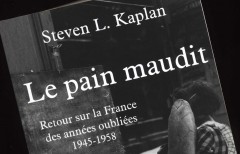Le Pain Maudit
Donnerstag, den 11. März 2010In 1951, a quiet, picturesque village in southern France was suddenly and mysteriously struck down with mass insanity and hallucinations. At least five people died, dozens were interned in asylums and hundreds afflicted.
For decades it was assumed that the local bread had been unwittingly poisoned with a psychedelic mould. Now, however, an American investigative journalist has uncovered evidence suggesting the CIA peppered local food with the hallucinogenic drug LSD as part of a mind control experiment at the height of the Cold War.
The mystery of Le Pain Maudit (Cursed Bread) still haunts the inhabitants of Pont-Saint-Esprit, in the Gard, southeast France.
On August 16, 1951, the inhabitants were suddenly racked with frightful hallucinations of terrifying beasts and fire.
••• Das wäre auch einmal ein dankbares Sujet: Ein Dorf versinkt in Halluzinationen. Das merke ich mir mal zum Stichwort »Dystopie«. Eigentlich ist alles, was man sich da ausdenken könnte, schon einmal geschehen… Erschreckend.










